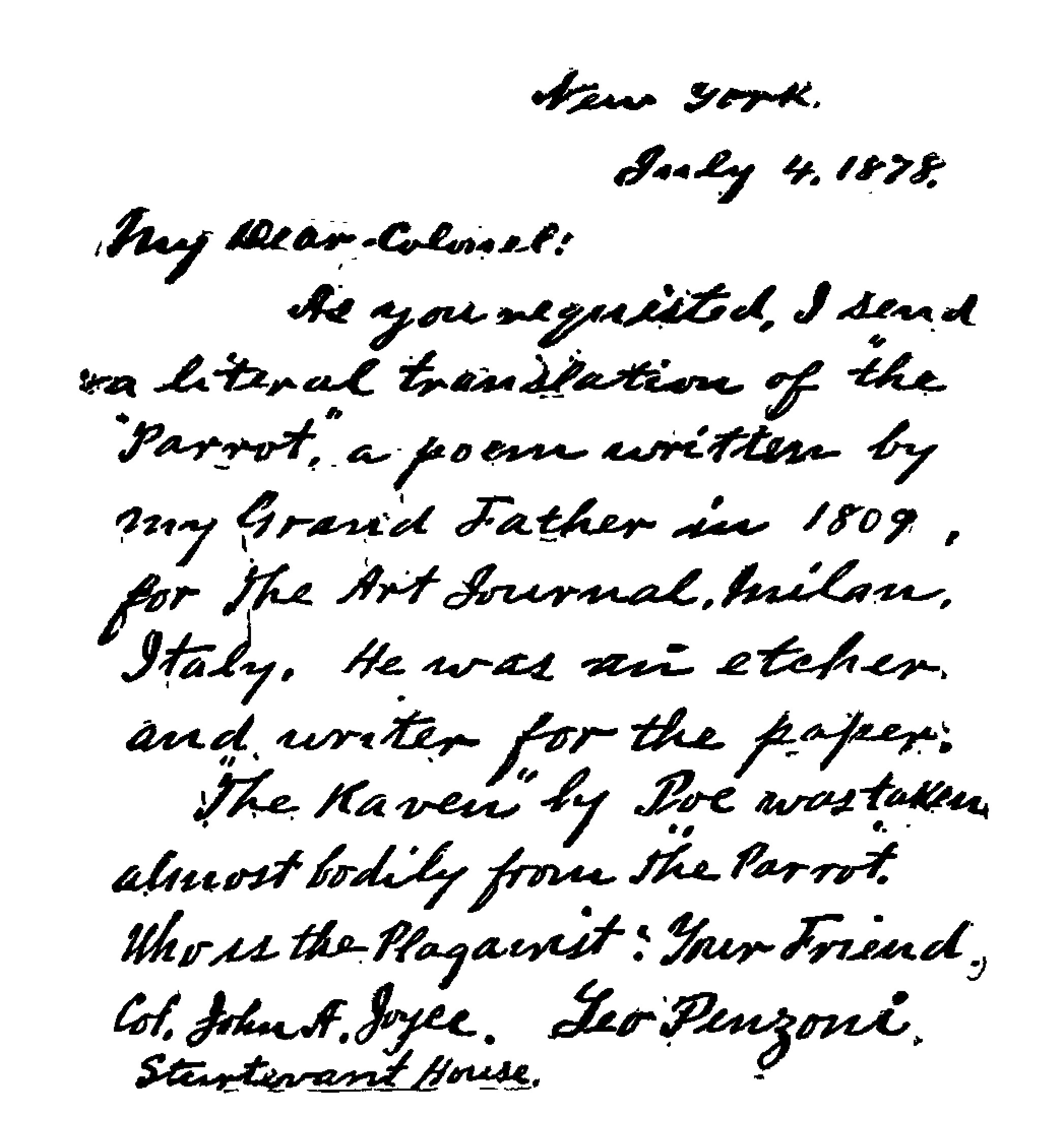Penzoni and Poe, "The Parrot"
by John A. Joyce
The last few pages of John A. Joyce's Edgar Allan Poe are taken up by this tale, indicating that Poe cribbed "The Raven" from an Italian poem entitled "The Parrot". The story is excerpted below. (Read "The Parrot" here.)
In the spring of 1878, during my “flyer” in Wall Street, I became acquainted with Mr. Leo Penzoni, a peripatetic Italian artist. He painted from the nude and also sang in opera, being a fine linguist, speaking fluently Italian, Spanish, French, German and English.
Penzoni was about thirty-five years of age, six feet tall, with black eyes and hair, Roman nose, wearing a broad brimmed hat, a typical cavalier, who was not only capable of “painting” the nude, but also the town, in midnight moments, with cardinal colors.
Penzoni drifted about the world on the ocean of life, like a stormy petrel, turning up periodically in New York, London, Paris, nnd Milan, his native city. His poetic and jolly nature captivated me at once, and as we were about the same age, with bohemian dispositions, we very naturally drifted together, dined, wined and wandered around the fantastic resorts of Gotham, spending many evenings at theatres and operas, or mingling with the “bloods” who linger around the Fifth A venue, Hoffman House, Brunswick, Sturtevant or Delmonico's, and other festive “joints” where fun and folly raised the auction at the bid of Bacchus and Venus. The “boys” are doing the same thing to-day.
We often sang and recited poetry for the edification of the gaudy “bugs” and “butterflies” that buzzed about us, boasting of our great authors, Penzoni lauding his Italians to the skies, who had more than two thousand years the start of the lettered men of America.
Of course he had me on the hip, as it were, when comparing our authors with such genuises as Angelo, Raphael, Horace, Virgil, Tasso, and Dante; but I boasted of our West, Trumbull, Powers, Irving, Cooper, Hawthorne, Longfellow, Bryant, Payne, Prentice, and especially Edgar Allan Poe, winding up my encomiums of the latter with a recitation of “The Raven.”
Penzoni laughed outright in my face one evening at the Sturtevant House, surrounded by a coterie of “town tumblers,” and immediately said that “The Raven” was stolen almost bodily from a poem entitled “The Parrot,” written by his grandfather for the Art Journal of Milan in the year 1809.
All the “boys” at the table defied him to produce the poem and back up his emphatic assertion. While he could not give at the time all the verses, he recited a half dozen or more, and promised that he would make a literal translation of the poem when next in Milan, and if possible get a copy of the paper, and on his return to New York, let me know of his success.
About four months afterwards I received from him the following letter and poem. It has lain for more than twenty-two years in a pocket of my trunk, almost forgotten; but as the public will be interested and benefited by everything relating to the late Edgar Allan Poe, I give Penzoni's letter and ”The Parrot“ in the fac-simile of his handwriting, just as I first saw it at the Sturtevant House.
I have been an ardent admirer of Poe's erratic and lunatic genius for nearly fifty years, and during my schooldays in Kentucky was noted for reciting his “Bells,” “Annabel Lee,” and “The Raven”; poems of rare and curious combination.
There is certainly a very marked similarity between “The Raven” and “The Parrot,” and one might be taken directly from the other with but very little alteration.
Whether Penzoni or Poe composed the original it is not for me to say.

Col. John A. Joyce,
Sturtevant House.
New York, July 4th, 1878.
My Dear Colonel: As you requested I
send a literal translation of ‘The Parrot,’ a poem written by my grandfather in 1809, for the Art Journal, Milan, Italy. He was an etcher and writer for the paper. ‘The Raven,’ by Poe, was taken almost bodily from ‘The Parrot.’
Who is the plagiarist?
Your Friend,
Leo Penzoni.”
Penzoni and Poe, Edgar Allan Poe by John A. Joyce, 1901. (PDF)